Inflammatory processes occurring in the oral cavity can often affect the upper palate, which causes some discomfort and causes painful sensations. Some patients do not take this problem seriously, but in vain! Soreness, swelling and redness of the roof of the mouth may indicate serious illnesses, so the symptoms cannot be ignored. At the first signs of inflammation, consult a doctor.
Why does the roof of my mouth hurt - causes, treatment? How to treat and what to do if a child has similar problems? We will consider all these questions in detail in this article. But the first thing we will get acquainted with is what function the palate performs in the human body.
Sky- this is the vault of the mouth that separates oral cavity from the nasopharynx, which is connected to the larynx. Distinguish two parts of the palate- hard and soft. The first consists of bone tissue upper jaw. Second - soft muscle tissue where it most often happens inflammatory process.
This organ is very important. It is thanks to the palate that the food we eat does not enter the nasopharynx. The organ participates in the breathing process, directing the inhaled air. Ventilation of the middle ear also does not occur without the participation of the palate. Receptors located on the mucous membrane are connected to the larynx and influence the formation of a certain vocal timbre and the pitch of sounds pronounced by a person.
Why does the palate become inflamed?
There are many reasons for the occurrence of inflammatory processes, so let’s look at the main ones.
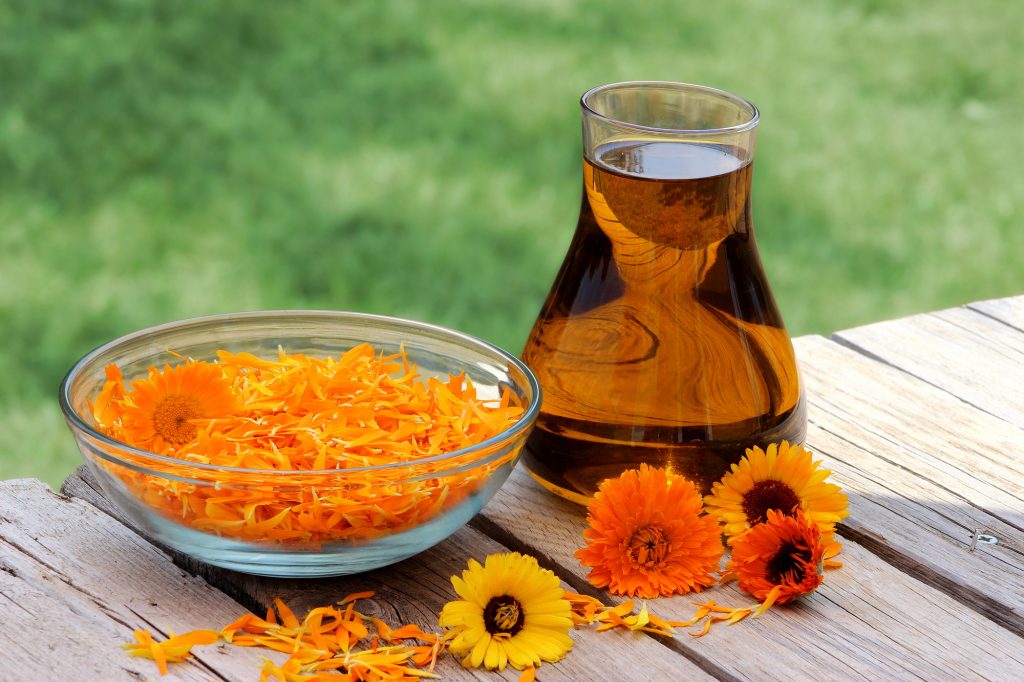
Symptoms
Very often, patients ask the question: “The upper palate in the mouth is itchy and inflamed. How to treat, causes and what to do in such a situation? Before starting treatment, it is necessary to identify the causes of inflammation, which are expressed by characteristic symptoms.
In each individual case, the symptoms of the disease will be different. It all depends on the cause of the inflammatory process.
In case of burn or injury, a person experiences pain during eating and chewing. As a rule, such injuries heal very quickly without any treatment.
Inflammation caused by yeast– candida, very often observed in young children (under 1 year). If the palate has a yellowish tint- This a clear sign problems associated with the filtering organ - the liver. Red color– indicates infectious disease throat - sore throat. The disease affects various organs. The tongue swells, and increased salivation is observed. Severe pain The throat and soft palate are affected. The temperature rises in some cases.
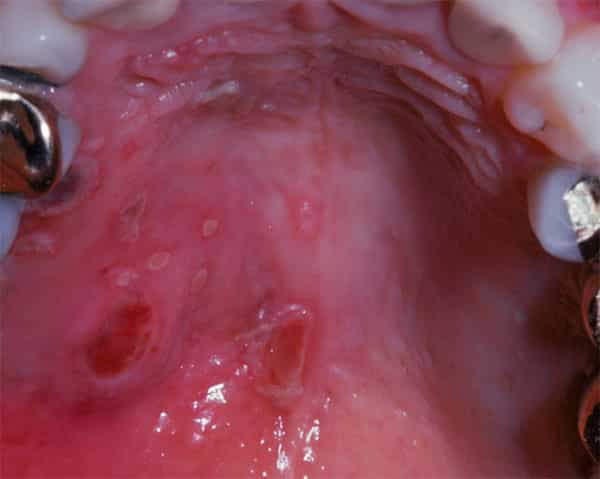
Ulcers on the upper palate after a burn
To determine the cause of pain, you will need the help of a doctor. Various specialists deal with such issues: dentist, therapist, otolaryngologist, etc. The doctor will examine the oral cavity and determine the nature of the inflammation.
Sometimes an examination may be required to make a diagnosis, since the cause of the disease may lie in pathological changes, occurring in the body or in impaired immunity.
If the patient has allergic inflammation of the palate, you will need to do tests (applying an allergen to the mucous membrane). The result of the study will be visible in a day.
How to treat inflammation of the palate?
We will try to answer frequently asked questions: “The inside of the roof of the mouth hurts, how to treat it? Inflammation on the roof of the mouth - causes? Treatment at home? Photos of inflammatory processes occurring in the oral cavity can be found on our website.
Treatment of the palate depends on the nature of the inflammation. It is very important to exclude all irritants (salty, hot, hard and spicy foods), otherwise the healing process will be slow. Smokers should forget about cigarettes for a while, as smoking interferes with the restoration of mucous membranes.
If redness is caused by minor damage to the mucosa, it is enough to rinse with decoctions from medicinal herbs. They have excellent antiseptic and wound healing properties. calendula, chamomile and sage. Helps relieve inflammation Oak bark. The prepared decoction is used to rinse the mouth. It should be warm, as hot liquid can injure the mucous membrane.
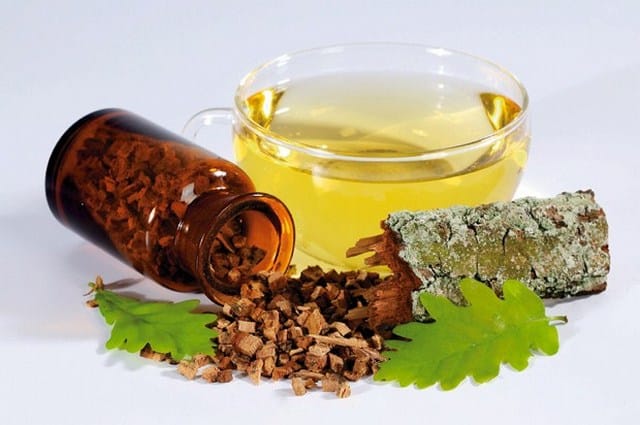
Oak bark, chamomile, calendula
The use of medicinal plants as antiseptics, quite justified. The beneficial microelements contained in their composition help relieve inflammation and prevent the spread of pathogenic bacteria that enter the human oral cavity. It is bacteria that penetrate the wound that cause exacerbation and intensify the inflammatory process.
If the problem is caused by stomatitis, requires the use of medications, medical supplies having an antiseptic effect.
The choice of medications – antiseptics – is great. Gels for external use, tablets and sprays, will effectively and quickly relieve pain and heal the injured mucous membrane. The most popular are:
- Lidochlor gel;
- Chlorhexidine solution and gel;
- Rotokan rinse;
- Chlorophyllipt.
With strong pain syndrome combination drugs are used:
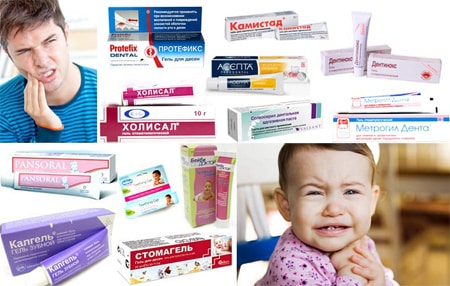
Inflammatory processes caused by fungi, treat:
- Clotrimazole.
- Nystatin ointment.
- Mikosan.
- Pimafusin.
Propolis tincture(for mouth rinse) and sea buckthorn oil(for application to inflamed areas) - will significantly accelerate the restoration of mucous membranes.
For sore throats and tonsillitis, carry out therapy using antibacterial agents and herbal decoctions. If inflammation of the palate is caused by dental problems, first of all, the cause must be eliminated.
Causes of palate tumor
What to do if the roof of your mouth is swollen and inflamed? Treatment depends on many factors. It is important to identify the problem that led to swelling and inflammation of the organ. Let's look at why palate tumors appear and their types.
Exists two forms of tumors– benign and malignant. Neoplasms having malignant nature – cylindroma and glandular cancer. Chemotherapy and other drugs used in the treatment of oncology are used as treatment.
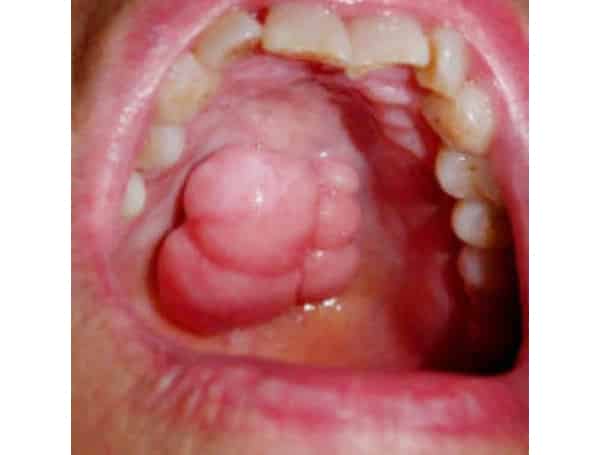
Upper palate cancer
Benign neoplasms are:
- Fibroma. It has the appearance of a rounded formation, its color is no different from the color of the mucous membrane.
- Lymphangioma. Inflammation lymphatic vessels which occurs due to injuries to the mouth and nasal cavity.
- Hemangioma. Tumors of the vascular type, which, when pressed, become smaller and acquire a pale tint.
- Papilloma. Tumor of the mucous membranes and skin, which is characterized by the presence of multilayer epithelium. It can be smooth or in the form of a papilla.
A number of medical procedures are used for this:
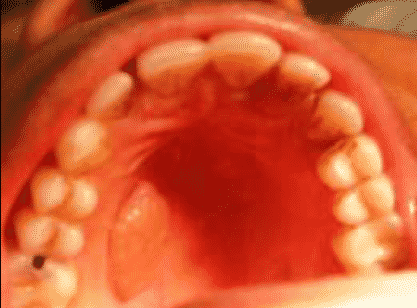
For any inflammation of the palate, you should visit a doctor. This will help identify problems in early stages and prevent the development of tumors.
Preventive measures
By observing basic rules of personal hygiene, you can prevent inflammation of the palate. What needs to be done for prevention purposes?
- Brush your teeth regularly (2-3 times a day).
- After eating, rinse your mouth with special solutions.
- At least 2 times a year preventive examination at the dentist.
- Abstain or reduce the consumption of solid foods, spicy and salty foods.
- Strengthen the immune system.
- Temper yourself.
- If you have allergies, avoid contact with allergens.
Using the above recommendations, you can protect yourself as much as possible from possible problem. It is important not to self-medicate and if symptoms appear, immediately consult a doctor to identify the causes and get effective treatment.
If you experience pain in the upper part of your mouth, you should immediately consult a specialist. You should not treat inflammation of the palate at home, because the reasons for this manifestation may be various diseases, including malfunctions internal organs. As a rule, discomfort in this area occurs when:
- violation of the integrity of the mucous membrane;
- metabolic disorders;
- inflammatory processes of various nature.
Having found out the cause of the redness, the specialist will prescribe treatment. Before going to the doctor, you can try to reduce the level of discomfort if the cause is obvious.
What can you do if your palate is inflamed?
If the oral mucosa is slightly injured, then traditional medicine can be used. Various rinses with antiseptic decoctions will not cause harm, but will slow down the inflammatory processes in the wound. In addition, some herbs have an analgesic effect, which will improve your overall well-being.
For dental reasons, only a visit to the dentist will solve the problem, but you can also soothe the pain for a while with the help of folk remedies. It should be understood that, most likely, pain symptoms caused by inflammatory processes, which means you can’t do without pharmaceutical drugs. If the oral mucosa is affected by stomatitis of any kind, antifungal ointments, sprays or gels should be used. As a rule, they are prescribed in combination with antiviral drugs.  Discomfort in the upper palate can also be caused by more serious diseases, such as tumors of various natures or trigeminal neuralgia.
Discomfort in the upper palate can also be caused by more serious diseases, such as tumors of various natures or trigeminal neuralgia.
The most common reasons redness of the palate are: sore throat, pharyngitis, laryngitis of varying severity. If you have a sore throat, general weakness, or elevated temperature, then most likely these are the reasons. In this case, remove unpleasant symptoms Gargling will help your throat. Decoctions of chamomile, sage, calendula or sea buckthorn will help reduce redness, soften the throat and reduce inflammation. The healing process can be accelerated by rinsing with propolis tincture.
Prevention of inflammation of the upper palate
To avoid an unpleasant situation, you should pay a little more attention to daily oral hygiene. Rinsing after meals, correct and balanced diet, strengthening the immune system, regular visit dentist - compliance with these simple rules will help reduce the risk of problems occurring to a minimum.
The inflammatory process in the upper part of the oral cavity can cause a large amount of discomfort and pain. Treatment for inflammation of the palate in the mouth should begin after the etiology of the existing pathology has been determined.
Varieties
There are many reasons for the appearance of the inflammatory process that develops in the palate, so only the most basic ones should be considered:
- Stomatitis. A disease the appearance of which is provoked by fungi that affect the mucous membrane of the oral cavity, and therefore the palate.
- Infectious diseases , for example, such as laryngitis, sore throat, and so on, can trigger inflammation.
- Mechanical injuries that were obtained while eating solid foods.
- Oral burn(hot food and drinks).
- Contact type of inflammatory process. Elimination of dental pathologies using dentures.
- Diseases of a neuralgic nature.
- Inflammatory process of the hard palate, which was provoked by dental diseases (pulpitis, etc.).
- Allergic reaction. It may be caused by various medications. Allergy manifests itself in the form of swelling of the mucous membranes, as well as a rather painful condition.
How to treat?
How inflammation of the palate will be cured depends primarily on the nature of the inflammatory process. It is very important that absolutely all irritants are eliminated, otherwise the recovery process can be greatly extended. People who smoke It’s worth giving up this habit at least for a while, because smoking interferes with the healing of the mucous membrane.
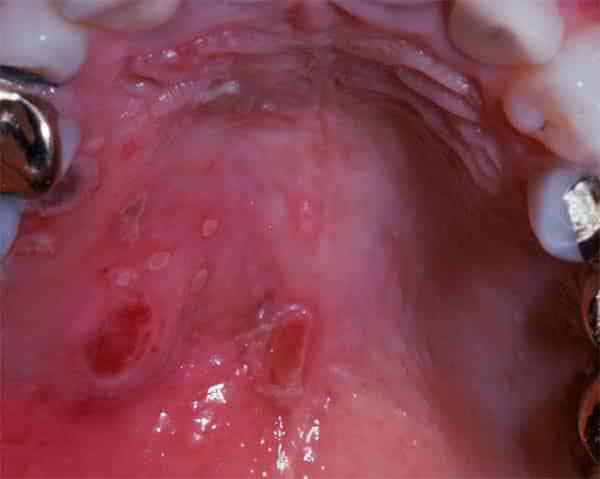
If the problem is caused by stomatitis, it is necessary to use medications that have an antiseptic effect in treatment.
The choice of antiseptic drugs is huge. Gels that should be used externally, as well as various tablets and sprays, will effectively and very quickly remove pain and restore damaged mucous membranes.
The most popular drugs:
- Lidochlor gel;
- Chlorhexidine solution and gel;
- Rotokan mouth rinse;
- Chlorophyllipt;
If there is severe pain, you can use medications with a combined effect:
- Cholisal gel;
- Komistad gel;
- Kalgel, which can also be used in small children;
Fungal inflammatory processes should be treated:
- Clotrimazole;
- Nystatin;
- Mikozan;
- Pimafusin;
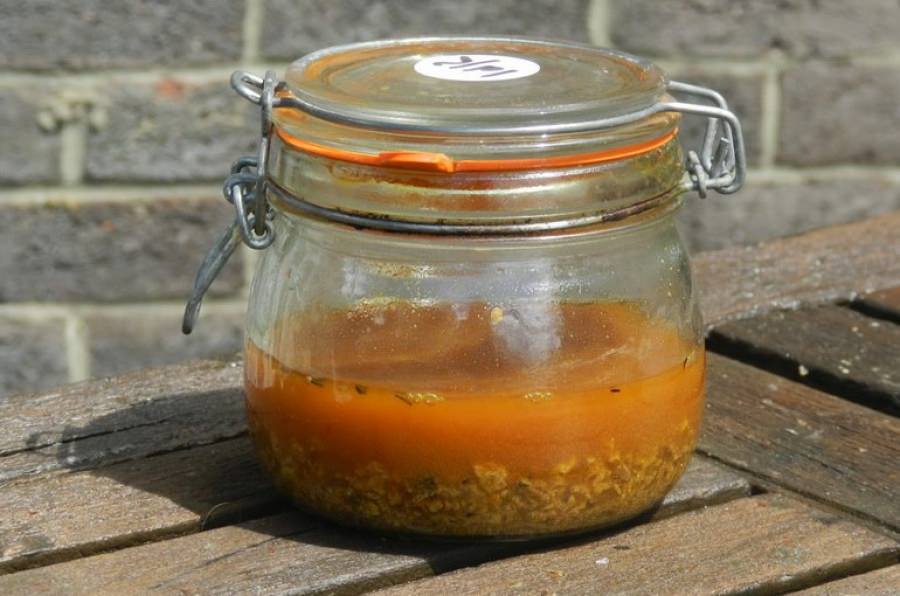
Propolis tincture intended for rinsing the mouth, as well as sea buckthorn oil to apply it to injured areas - significantly accelerates the healing of the mucous membrane.
If there is tonsillitis or tonsillitis, treatment is carried out using antibiotics and herbal decoctions. If the inflammatory process was caused by dental diseases, the cause of the disease must first be eliminated.
ethnoscience

A decoction of oak bark, which must be prepared using a water bath, will help remove the inflammatory process. The liquid needed for the procedure must be at room temperature.
Small mechanical injuries does not need to be treated using any special methods. They heal fastest in the mouth herbal decoctions.
Medicinal plants have long been famous for their properties, which allow them to quickly restore mucous membranes and also kill microbes.
Infusion of sage or chamomile heals wounds and destroys harmful microbes. Rinse really has a significant effect on the restoration process of damage healing and elimination of inflammatory processes on the mucous membrane.
The oral cavity contains a huge number of bacteria that can penetrate damaged areas and provoke the development of the disease, as well as the deterioration of the patient’s condition.
Other methods:
- Crush the garlic into a paste, add 200 milliliters of water to 100 grams of the mixture. The composition is infused for 6 hours.
- 50 grams of dried viburnum berries Boil in a liter of water for 20 minutes.
- Take 2 tablespoons of raspberry leaves and branches, pour a glass of boiling water and let it brew.
- 150 grams of St. John's wort are poured with 700 grams of vodka, after which the mixture is infused for 7 days. Take 40 drops orally with water.
- Pour 2 tablespoons of onion peel into half a liter of water, boil and let it brew for 4 hours. Strain the mixture and use for mouth rinsing.
Prevention measures
 Subject to standard rules hygiene, the occurrence of inflammatory processes in the palate can be avoided.
Subject to standard rules hygiene, the occurrence of inflammatory processes in the palate can be avoided.
Here's what you should do for proper prevention:
- Systematically, that is, 2 or 3 times a day, brush your teeth.
- After eating you need to rinse your mouth by special means.
- You should visit your dentist at least twice a year for a standard oral examination.
- You should completely avoid or limit your intake of solid foods, as well as foods that are too spicy or salty.
- You should strengthen your own immunity.
- It is necessary to toughen up.
- If manifestation is possible allergic reactions, contact with irritants must be avoided.
As soon as the first signs of the disease become noticeable, it is necessary to immediately visit a specialist who will help determine the cause of the disease, and then prescribe effective therapy.
Inflammation of the palate appears due to the influence of both external and internal factors. At first it may seem that this is not such an important problem, but in the absence adequate treatment it can lead to very unpleasant consequences.
Pain in the sky
Pain in the palate- This is pain in the area of the soft and hard palate, resulting from damage to nerve endings.
Diseases accompanied by pain in the palate
Pain in the palate occurs in following cases:
Internal violations;
Functional disorders;
Infectious diseases.
The hard and soft palate may hurt when the following diseases:
Tonsillitis;
Inflammation of the processes of the soft palate;
Angina.
Caries;
Osteomyelitis;
Pulpitis;
Periodontitis;
Neuralgia;
Dysfunction of the temporomandibular joint;
Stomatitis.
To summarize, we can say that pain in the palate is caused by damage to the mucous membrane, proximity facial nerves, damage to the oral cavity.
Causes of pain in the palate
The causes of pain include: mechanical damage, causing damage nerve endings and activation of pain receptors in the oral cavity.
Mechanism of symptom occurrence:
Solid food or foreign body causes damage to the mucous membrane of the palate;
The wound becomes inflamed;
Pain appears in the area of the hard and soft palate.
With caries or other diseases of the oral cavity, pain at the site of inflammation spreads to the palate. It begins to hurt when eating cold, hot or while chewing.
The palate may hurt due to inflammation of the tonsils.
The mechanism of pain in this case is as follows:
The tonsils are covered with depressions;
Germs get stuck in them;
The tissue begins to become inflamed;
Pain appears in the throat and soft palate.
Characteristics of pain in the palate
Injuries and damage to the palate. The pain is constant and can be described as nagging. Eating will also be difficult and accompanied by increased pain.Dental diseases. It's a dull pain, most often worsened by eating too hot or too cold food.
Stomatitis– small red ulcers appear on the mucous membrane.
Depending on the disease, pain in the palate may make it difficult to eat and swallow, the temperature may rise, and apathy towards everything around you may occur. Pain in the sky is characterized by its obsessiveness and intensity. It is almost impossible to tolerate, it deprives you of sleep.
Modern treatment of pain in the soft and hard palate
In case of damage to the mucous membrane, it is best to consult a doctor. Only he can pick you up necessary treatment. You can rinse your mouth with iodine solution and salt yourself. You can also use a weak solution of potassium permanganate for rinsing. This way you can get rid of the infection.Toothache causes discomfort in the soft palate. It is advisable to immediately go to the dentist; you should not delay dental treatment. But, if you cannot immediately visit a specialist, take a pain reliever (non-steroidal anti-inflammatory drugs - for example, ketonal, ketanov).
Stomatitis are being treated antibacterial drugs, immunostimulants and antiulcer agents. All this will speed up the healing of ulcers.
Tonsillitis. Antibiotics are most often used for treatment: erythromycin, sumamed. Tonsil rinsing is prescribed. Sometimes it becomes necessary to remove the tonsils.
At neurological diseases anticonvulsants are used.
For whatever reasons you have pain in the palate, the most the best option, see a doctor! He will identify the cause of the pain and prescribe correct treatment. Self-treatment may aggravate the disease and cause complications.
The tongue in the oral cavity is constantly in contact with the upper palate. Because of this, when the palate is inflamed, a person feels pain even in calm state, and even more so during a conversation or while eating. Inflammation of the palate - unpleasant problem, which, although it does not pose a direct threat to human life, can greatly reduce its quality. Unabated painful sensations prevent you from doing your usual activities, make it difficult to eat, and discourage you from talking. If pathological process observed for a long time, the person becomes irritable, he develops apathy, impotence, and may even experience weight loss. What are the causes of inflammation of the palate and how to deal with this problem, you will learn from our article.
Anatomical features and functions of the palate
Raising your tongue, you will rest it on the upper palate - a rigid partition separating nasal cavity from the mouth. On the side of the oral cavity, the palate is covered with a sensitive mucous membrane, which is susceptible to inflammation. Anatomically, the palate consists of 2 zones:
- hard palate - it is located immediately behind the front incisors, formed by bone plates, and has a concave shape;
- soft palate - located near the throat, formed from muscle tissue, ending with the uvula.
The functions of the sky can be underestimated at first glance, but this anatomical structure human body plays a significant role in the processes of nasal and oral breathing, articulation, and nutrition. The palate limits the oral cavity from the nasal cavity, preventing consumed drinks and foods from entering the nose. In addition, the palate is involved in the process of ventilation of the middle ear.
Inflammation in the upper palate complicates the normal course of all the above-mentioned processes and causes considerable discomfort to a person, therefore, if signs of pathology appear, you must consult a doctor to determine the exact causes of the disease and prescribe treatment. In the meantime, while you are waiting for your meeting with the doctor, we suggest you find out what could lead to the development of inflammation and what can be done at home if the palate is inflamed.
The photo shows the hard and soft palates. Inflammation can develop in both areas.
Why does the palate become inflamed?
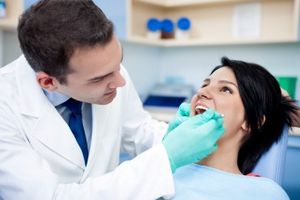
The exact cause of inflammation will be determined by the dentist during an examination.
The most common reason for an inflamed palate (and more often this occurs in the area behind the front teeth) is mechanical damage to tissue and the subsequent attachment of infection to the wound.
Injury can occur when eating too rough, hard food, with sharp edges, for example, crackers, caramel, seeds, nuts. In addition, a foreign object caught in food can injure the palate - a bone in fish, minced meat, a nut shell or a fruit pit.
The palate can be damaged by careless handling of cutlery or by having piercings in the mouth. It must be said that injury can also occur during dental treatment, for example, during tooth extraction, the instrument may come off its crown and damage soft fabrics oral cavity.
In young children, the cause of injury to the mucous membrane can be toys and other foreign objects that fall into the mouth. Infants who are teething are especially susceptible to this problem.
Important: treatment of inflammation of the palate in young children mandatory should be carried out under the supervision of a pediatrician or pediatric dentist! Do not self-medicate under any circumstances!
Often the cause of inflammation is thermal burn mucous membrane. Lovers of hot drinks and food are susceptible to this. Accidental or intentional exposure of chemical components to the mucous membrane can provoke chemical burn. Smoking and drinking alcohol also increases the likelihood of developing a pathological process, since nicotine tar and alcohol dry out the oral mucosa, making it more vulnerable and increasing its sensitivity.
Note: the mucous membrane of the palate has many nerve receptors, because of this its sensitivity is very high, and any damage to it, even a small scratch, can cause severe pain.
When damage occurs on the surface of the palate, pathogenic microorganisms can enter the wound. As a result, this will develop unpleasant disease like stomatitis. The risk of infection at the injury site is high in people who are not responsible enough for oral hygiene.
In addition to damage to the palate and infection in the wound, there are other causes of inflammation:
- dental diseases of the gums and teeth: caries, ;
- – refers to precancerous diseases;
- development of galvanism in the presence of prostheses and orthodontic structures made of dissimilar metals in the mouth;
- angina;
- taking certain medications (such as by-effect treatment);
- malignant and benign neoplasms;
- wearing (often the cause of inflammation is an allergy to the acrylic plastics from which the structures are made).
What to do if the palate is inflamed?
If the roof of your mouth is inflamed, your dentist should tell you how to treat the unpleasant disease. Since the pathological process can progress quickly, do not delay your visit to the doctor. In case of minor damage and impossibility of calling for medical care In the near future, you can try to cope with the problem on your own. So, how to relieve inflammation of the palate?
You need to start by eliminating the cause of inflammation: eliminating coarse food that irritates the oral mucosa and other traumatic factors from the diet, quitting smoking and drinking alcohol, and performing prosthetics using prosthetics, the materials of which are hypoallergenic and biocompatible with the tissues of the oral cavity.
Important: the speed of recovery depends on how carefully the patient takes care of the oral cavity.
To eliminate the inflammatory process, you can rinse your mouth antiseptic solutions. The most commonly used are Chlorhexidine, Stomatofit, its cheaper substitute, Chlorophyllipt, Miramistin.
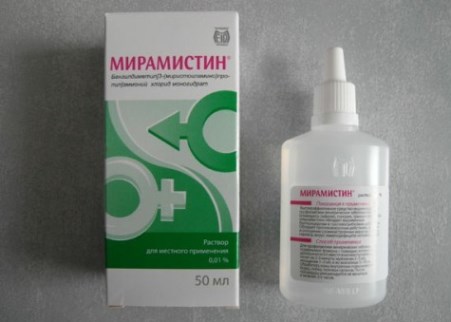
The photo shows one of the popular antiseptics - Miramistin.
If in home medicine cabinet If you don’t have any of the above drugs, you can prepare a soda-salt solution or a decoction of medicinal herbs. For cooking soda solution in glass clean water Dissolve a teaspoon of soda and salt. As raw material for medicinal decoctions Chamomile, oak bark, sage, and yarrow can be used.
To accelerate tissue regeneration and relieve inflammation, they are used dental gels, such as Metrogil Denta, . They have an analgesic effect.
Some have a good effect folk remedies, for example, compresses from propolis tincture and treatment of affected areas of the mucous membrane with sea buckthorn oil.
If the cause of inflammation in the oral cavity is more serious than mechanical damage to the mucous membrane, be sure to consult a doctor! For example, if the inflammatory process has developed against the background of a sore throat, you cannot do without taking antibiotics, and only a doctor should prescribe them. You should not use photos on the Internet to independently diagnose the disease and select treatment based on advice on forums. Take care of your health!








